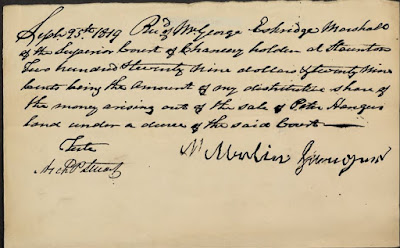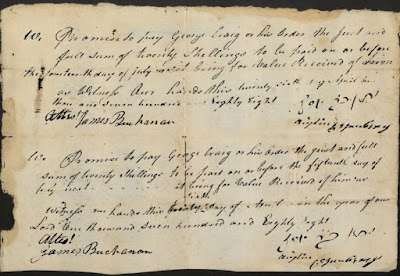Augusta County, Virginia Chancery Cause 015-1819-003:
Augustine Argenbright & wife, etc. vs. Peter Hanger, etc.
Plaintiffs
Augustine Argenbright, executor and husband of Barbara Hanger, daughter
George Baylor, Bernhard Lowman and Molly Hanger,
executors and executrix of Frederick Hanger Jr., deceased son
George Hanger, son
Martin Hanger, son
Jacob Friedly and wife Hannah Hanger, daughter
Defendants
Peter Hanger, son
Charles Hanger, son
Charles Shaver, perhaps counsel
John Hanger, son
John Wise and wife Catherine Hanger, daughter
Peter Eagle and wife Ann Eliza Hanger, daughter
George Eagle and wife Mary Eliza, daughter
Warner Peters and wife Eve (Hanger) Joseph, daughter
Betsy (Hanger) Thomas, daughter
Chancery cause 1819-003 began with 5th Great Grandfather Frederick Hanger and the distribution of his estate. Grandfather planned well for his family and wanted to leave his children cash legacies. That is except for sons Peter and Charles who inherited their father’s lands. These two sons were to pay their sibling’s legacies per a prearranged schedule stated in Great Grandfather’s will. Peter bought Charles’ land leaving him with the obligation to his brothers and sisters.
4th Great Granduncle Peter couldn’t or wouldn’t pay; thus the Chancery Court Cause. The suit dragged on for six years. You can read my earlier posts by clicking on the links at the end of this post.
Finally, in December 1818 the Staunton District Superior Chancery Court ruled Peter Hanger needed to fulfill his father’s wishes and pay the legacies. The District Marshall was instructed to sell his lands at public auction if necessary to raise cash.
Uncle Peter didn’t attend the December court session. His counsel represented him and “prayed for an appeal” in the Court of Appeals since the final decree was “adverse to his interests”. The Judge granted permission to take the suit to the Appeals Court.
Remember Peter wasn’t present when the final decree was pronounced. When filing an appeal, a security bond needed to be readied by the next court date of February 1, 1819. Uncle Peter didn’t know this and missed the deadline.
After realizing his error, Peter Hanger appeared before Judge John Brown of the Staunton Superior Court of Chancery explaining his ignorance of the bond requirement May 19, 1819. He filed a petition asking the Judge for more time hoping to get an appeal. The Judge allowed an extension, but it did Uncle no good. Although Peter made partial payments to several of his siblings, too much remained to be paid and Uncle’s lands would be auctioned off to cover the debt.
George Eskridge, Marshall of the Staunton Chancery Court, sold the Hanger land Sept. 20, 1819, to the highest bidders--Adam Grove and William Kerr. They paid $2,100 for the land. Interestingly, Peter Hanger’s wife, Susanna, was the daughter of Windle Grove and sister of Adam Grove. Susanna’s sister married a Kerr. It sounds as though Susanna’s family came to their rescue.
Martin Hanger’s Receipt for $229.29 dated Sept. 25, 1819
Image 52, Augusta County, Virginia Chancery Cause 015-1819-003: Augustine Argenbright & wife, etc. vs. Peter Hanger, etc.
By 1830 Peter, Susanna and their children left Augusta County, Virginia heading to Ross County, Ohio where Charles Hanger was living. After visiting his brother, he moved his family to Harrison, Champaign County, Ohio.
Earlier Posts
To view the 1819-003 Chancery Cause ‘Augustine Argenbright & wife, etc.
vs. Peter Hanger, etc.’ on the Library of Virginia website click here










